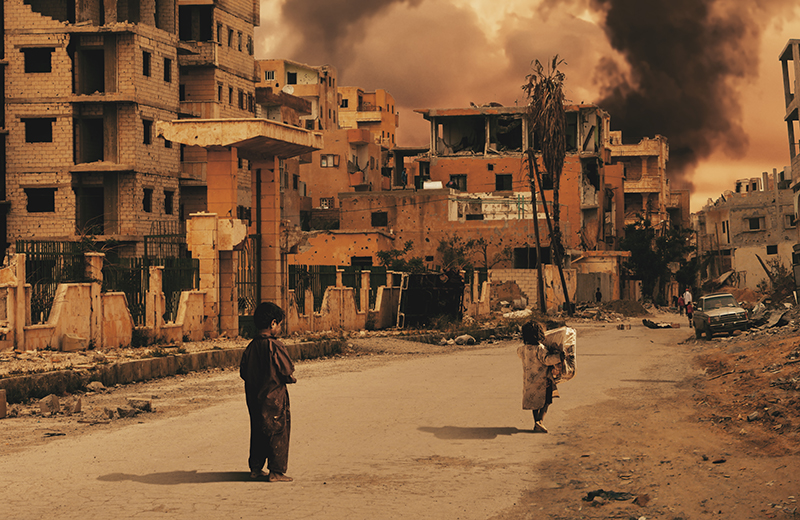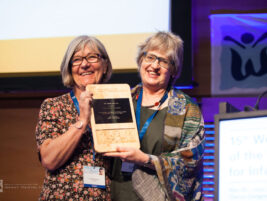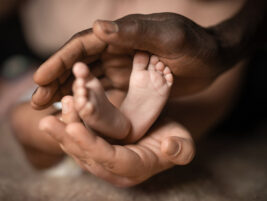Lending a voice to Infants in Crises
WAIMH continues its effort in bringing awareness to the plight of infants and professionals who work with them and their families in states of humanitarian and environmental crises. An infant has no political will, and only through the voice of adults who can move outside of agendas of those who hold power, can the cries of infants be heard who face the darkness of humanity. The WAIMH community chooses to be such a voice for infants around the world.
The Child and Adolescent Mental Health National Health Strategy 2023-2028 document is a collaborative partnership with the UK-charity Medical Aid for Palestinians (MAP) and The Royal College of Psychiatrists, UK, developed for the Palestine Ministry of Health.
“Today’s child in Palestine bears the burden of decades of violence, conflict and hardships that have accumulated during their lives and those of their parents and grandparents. Childhood is not a given for Palestinian children, but instead something that must be determined, retrieved, and understood within a complex web of implications mandated by the dynamics of power that are in play” (Pg. 4).
Palestinian Children at the Cold face of a Humanitarian Crisis
The majority of Palestinians, live in the State of Palestine, West Bank and in the Gaza Strip. A large number of these people are refugees: with an estimated 27 percent in the West Bank and 72 percent in Gaza. In addition, 1.7 million Palestinians live within the State of Israel. Following the Oslo accords, the Palestinian National Authority (PNA) was established in 1994 as the recognized governing authority of Palestine. The ongoing occupation and the stalemate in peace negotiations between the PNA and Israel place a heavy toll on the lives, health and security of Palestinians who face ongoing military attacks, restrictions and forced migration.
According to the State of Palestine National Health Strategy document:
- 2242 Palestinian children have been killed by Israeli military forces between the years 2000 and 2022.
- In Gaza, over 1,000 Palestinian children have died as a result of six major military offensives since 2005.
- In the West Bank, 781 Palestinian children were killed by Israeli military and police forces, settlers, and private security guards between 2011 and 2020.
- In 2021, 76 children were killed by live ammunition with 15 child deaths in the West Bank and 61 child deaths in the Gaza Strip comprising of 26 children aged 0 to 8 years, 17 children aged 9 to 12 years, 20 children aged 13 to 15 years and 15 children aged 16 to 17 years. Seven children were killed by rockets misfired by Palestinian armed groups in the Gaza Strip.
- In September 2022 180 child prisoners, representing 3.9% of the total number of detainees. There is a rising trend of younger children being put under house arrest. These children are prevented from attending school, seeing friends or engaging in activities impacting on the mental health of the family as a whole.
- In 2022, 58 Palestinian schools in the West Bank, including East Jerusalem, are under demolition or ‘stop work’ orders by the Israeli authorities impacting on hundreds of children’s access to education.
The Need for a National Strategy
During periods of humanitarian and environmental crises many local and international efforts are put in place to address the mental health needs of children living in most affected areas. Although these efforts benefit those who most need assistance, they are often in response to imminent mental health risk. The National Health Strategy incorporates a multi-level framework developed by the United Nations Children’s Fund (UNICEF) that sets key priorities for child and adolescent mental health so that funders, institutions, organizations and community members can align their activities in a coordinated and efficient way. This moves mental health from a crisis response to a protective mental health and wellness approach throughout a child’s developmental journey.
The strategy has four pillars and ten initiatives:
- Rights, Regulation and Standards:
-supports advocacy to protect children’s fundamental rights
-the review of regulation and legislation to ensure safe practice by professionals working with children
– institutional accreditation to raise standards of clinical care
- Promotion and Prevention: Promotes positive mental health and well-being through three initiatives from birth to adulthood:
– “Securing the Early Years” initiative for under five-year-olds focuses on giving every child the best start in life through developing secure emotional attachments and preventing or reducing toxic stress.
-“Protecting Childhood” initiative for five- to 12-year-olds creates spaces for children to play, learn and grow with ‘whole school’ approaches to well-being, outdoor play and encouraging families to reduce screen time and increase reading for pleasure.
-“Building for the Future” initiative for 13- to 18-year-olds empowers youth through developing skills for life and citizenship be they socio-emotional, literacy, numeracy and/or technical skills obtained through vocational, apprenticeship and mentorship programmes to prepare them for adulthood.
- Clinical Services and Capacity Building:
– Building services and professionals’ capacity so as to have sufficient capacity to meet demand and provide integrated, effective and efficient child and family-centred clinical services
- Community Integration and Contribution:
-Supports activities that enhance social integration through reducing stigma, and developing a sense of belonging, so children and adolescents engage in and contribute to the community.
Action Plans and Targets
State of Palestine, Ministry of Health Child and Adolescent Mental Health National Health Strategy document also includes a set of specified actions, identifies key stakeholders involved in operationalising targets and timelines for achievement. This makes the document not only an important theoretical framework for achieving mental health and well-being of all Palestinian children but also sets out specific plans to achieve strategic priorities. Incorporated into the document are goals for monitoring, evaluation, sustainability, and research for continuous assessment of the outcomes of the strategy.
State of Palestine Ministry of Health Child and Adolescent Mental Health, National Health Strategy 2023-2028
- A summary of the strategy development process can be found here: Developing a National Strategy for Child and Adolescent Mental Health in Palestine | BJPsych Open | Cambridge Core
Full reference: Dabbagh, N., Jaber, S., Raboczki, A., Tina, E., & Al-Uzri, M. (2023). Developing a National Strategy for Child and Adolescent Mental Health in Palestine. BJPsych Open, 9(S1), S84-S85. doi:10.1192/bjo.2023.264
- The complete document can be accessed here.
Acknowledgment and correspondence
WAIMH would like to thank Dr Nadia Dabbagh (Royal College of Psychiatrists, UK) who so generously shared the complete document with Perspectives in Infant Mental Health and has been instrumental in supporting infants in crises.
Correspondence can be sent to: Dr Nadia Dabbagh. Email: ndabbagh@hotmail.com
Authors
Salisha Maharaj,
Perspectives IMH Assistant Editor,
South Africa








